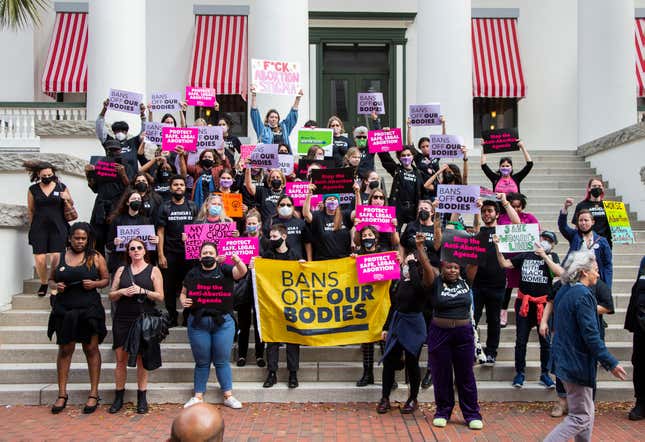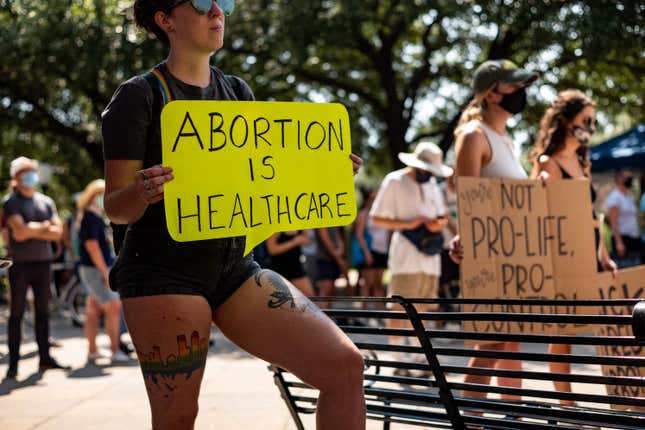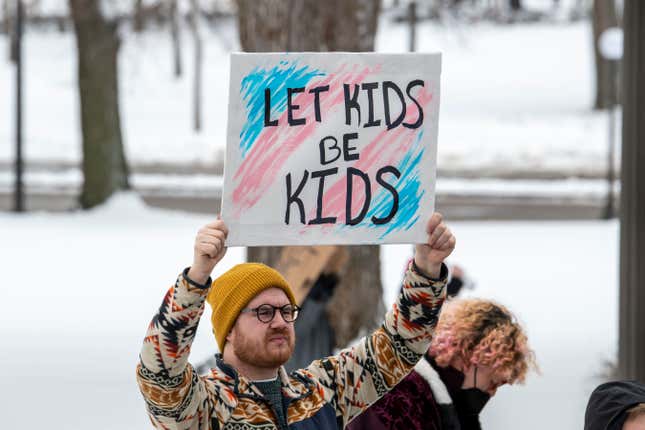Rachael Lorenzo recalls recently trying to support a woman who spoke Spanish, sought an abortion to flee a “violent situation,” and had several young children. The woman asked only that Indigenous Women Rising (IWR), the abortion and reproductive health fund that Lorenzo leads as executive director, mail her an envelope of cash to help her travel to Michigan for the procedure, and not call her cell phone unless she first sent a text message. Lorenzo sent the envelope of cash, but within days, it was mailed back to IWR, and they never heard from the woman again.
“It is such a sacred thing for someone to be so vulnerable with us, and to let us in on what’s happening in their lives when they might be in danger,” Lorenzo, who is based in New Mexico but supports Indigenous callers around the country, told Jezebel.
Since IWR was founded in 2014, it’s helped people seeking abortion care across a variety of circumstances and barriers. These are the patients and abortion seekers—young people, Indigenous people and people of color, low-income people, victims of domestic violence—who can’t always travel, and certainly can’t move to another state, when their states enact reckless, devastating abortion bans. With the conservative majority in the Supreme Court making it crystal clear that the constitutional right to abortion “must be overruled,” as a just-leaked decision draft from Alito spewed, their situation is all the more dire. These spreading precedents are inextricably connected to a rising tide of anti-trans legislation, which similarly attacks bodily autonomy by criminalizing gender-affirming health care for kids, or banning trans youth from school sports.
In the wake of legislation like this, sparking public health emergencies that carry the most impact for marginalized people, residents and supposed advocates from states with more liberal laws often share no shortage of unsolicited advice on social media. Much of this “advice” hinges on those in affected states just “voting harder”—despite the fact that abortion bans and anti-LGBTQ laws are widely unpopular, and enabled by rampant voter suppression. Their “support” also impels people to up and move to another state, as if it’s that easy. Even leading liberal politicians from Democratic states have co-opted some of this language: Following moves by Texas to criminalize gender-affirming care for trans youth, California Gov. Gavin Newsom tweeted earlier this year, “To fearful families in Texas right now—California’s door is always open to you.” The sentiment was echoed in regards to Florida’s “Don’t Say Gay” bill by New York City Mayor Eric Adams, who tweeted: “You’re welcome in New York City...Always.”

To a keen eye, these messages exude the same hollow, even counterproductive energy of the Women’s March of Los Angeles’ January attempt to shut down a tournament hosted by the U.S. Women’s National Soccer team in Texas over its six-week abortion ban, and before that, the slew of Hollywood boycotts of production in Georgia, following the signing of its 2019 abortion ban. Who were these boycotts really punishing? And today, who is it really helping to tell people to leave their communities for health care that should be their constitutionally protected right, anywhere in this country?
This particular breed of well-meaning, if not opportunistic, activism is all the more counterproductive when organizers in impacted states have been clear, time and again, that there are actual actions politicians and advocates in all states can take to support abortion and trans rights—most notably by listening to those on the ground, who are running local abortion and gender-affirming care funds in their communities.
“It’s about ownership—not just ownership from the state in implementing these homophobic, sexist views on gender and abortion,” said Lorenzo. “But also, for people telling others to move, it’s another form of saying that your ownership, your ties to your land and communities, are disposable.”
No one should have to travel, let alone pack up and move, to access basic health care like abortion or gender-affirming health services. Nor should anyone living through these crises have to put up with being told to “just” travel or move by folks two timezones, three tax brackets, and six state borders away.
Telling people seeking abortions or gender-affirming care to move causes damage
While hundreds of abortion restrictions and bans have passed in the last decade, the most recent and arguably most terrifying surge began with Texas’ six-week ban S.B. 8, which deputizes citizens to spy on and launch costly lawsuits against other citizens and providers. S.B. 8 took effect last September, prompting over a dozen copycats—including in Oklahoma, a state neighboring Texas that’s absorbed thousands of Texans seeking abortion care. Meanwhile, other states, primarily across the South and Midwest, latched onto Texas’ ban to frame their own 15-week abortion bans as “generous,” all as the Supreme Court prepares to rule on a 15-week ban in Mississippi this summer. To state the obvious, there’s nothing generous about any law that would force someone to be pregnant and give birth against their will, at any point in their pregnancy.
Advocates in these states aren’t going anywhere—and they certainly aren’t looking to Twitter users from California for ignorant platitudes. In fact, Aimee Arrambide, executive director of Avow Texas, tells Jezebel that misinformation is one of the largest barriers to organizing for reproductive rights locally in Texas—and much of this misinformation can come from non-Texans, at times inadvertently sowing chaos with each viral social media post they share. At the beginning of S.B. 8’s reign of terror, Arrambide says it was a challenge just to inform many Texans about when the law took effect, the existence of abortion funds (which offer direct financial aid to people for both abortion care and all associated logistical costs), and the option to travel out-of-state for care. Social media posts from white women in New York offering to singlehandedly create abortion “underground railroads” when funds already exist certainly didn’t help. Instead, their voices drowned out those of people who could accurately speak to Texans’ full range of options.
Arrambide has been organizing for reproductive rights in the state throughout her career. “It’s so insulting to the people that have been on the ground doing this work for decades, trying to ensure access to no avail, to act like you have the answers and we don’t,” she said. “And the answer absolutely isn’t to only have a few sanctuary states, and then half the country has to travel far distances, spend lots and lots of money, in order to access basic medical care that we should have within our own community.”
Hand-in-hand with the right’s invigorated war on abortion, trans people have also been the targets of Republican state lawmakers. Bans on trans youth participation in school sports have recently been signed into law in states like Alabama, South Dakota, Utah, and Kentucky, while Alabama and Texas have been attempting to charge parents and doctors who help kids transition and access life-saving, gender-affirming care with child abuse. And back in March, Idaho Republicans introduced a nightmarish bill that would quite literally trap people seeking gender-affirming care within state lines, while Missouri Republicans floated a bill that would allow private citizens to sue anyone who aids and abets an abortion, no matter where it’s performed. Meaning, in some states, “just move” or “just travel” wouldn’t just be condescending advice—it could be legally risky.
Daunting logistics aside, Lorenzo believes telling people in red states to move is tantamount to telling them they’re “disposable,” or assuming “they automatically have the willingness and resources.” They argue this is “a colonialist, white supremacist way of looking at travel, looking at land.”
“Nobody should have to move to just survive,” they said.
Moving isn’t an option for undocumented people
Italia Aranda, an organizer at Mariposa Fund, works closely with callers who cannot move—or sometimes even travel—to get abortion care, full-stop: undocumented people. Because of immigration checkpoints scattered all across Texas, attempting to travel great distances or out-of-state to get an abortion can come at the risk of deportation or criminalization.
Of course, barriers to abortion aren’t new for undocumented people, who are more likely to be uninsured, have zero paid time off, and are already marginalized by the medical system. “For patients who are undocumented, traveling in search of access to medical procedures has always involved risk of deportation for something as simple as a routine traffic stop,” Aranda told Jezebel. But challenges have certainly grown since S.B. 8—especially as she says Mariposa has seen its volume of callers nearly double since the Texas ban took effect.

Today, many of these undocumented people are forced to contend with a devastating non-choice: “Time and time again, we have spoken with patients who feel like accessing abortion services is so vital in their lives that they’re willing to take this huge risk,” Aranda said. For instance, she says Mariposa often works with mixed-status families, or people seeking abortions who have undocumented parents. Undocumented parents who aren’t able to travel with their children who are seeking abortion care instead rely on family members or friends who are documented to “chaperone” their kids, Aranda says. Laws like S.B. 8 complicate this further by exposing these family members or friends to exorbitantly expensive civil lawsuits.
The fight for abortion access for undocumented Floridians is personal to Julia Desangles, co-executive director of Florida Access Network (FAN), who has family members who are undocumented and is horrified by the number of immigrant detention centers across the state. Even before Gov. Ron DeSantis signed the state’s 15-week ban into law, FAN already had its hands full with supporting clients through Florida’s wide variety of existing abortion restrictions, as well as the concentration of clinics in metropolitan areas, inaccessible to people from poorer parts of the state. And it’s not platitudes or open-armed, social media “welcomes” from liberal politicians from other states that will help marginalized Floridians facing the greatest barriers. “We need politicians with that kind of platform to be naming and speaking out about abortion funds, the only organizations working directly with clients to financially support them,” Desangles told Jezebel.
Aranda similarly says onlookers who are still inclined to render useless “advice” should be supporting groups like Mariposa instead, which exist precisely to help undocumented families and abortion seekers stay in their communities, either through donations or by amplifying the work they do. Arranda also believes that “increasing abortion access for everyone, anywhere, regardless of immigration status, would be a tremendous relief for those who need to travel out-of-state” for care. In other words, she calls on people from states with more liberalized laws to look within, and address barriers to abortion that they may not even realize exist in their own states to consequently help those in more abortion-hostile states who will travel there for care. Arranda specifically points to initiatives in Oregon, California, and from city councils in New York City, Austin, and Portland to directly fund abortion access.
These efforts, she says, go a lot further for undocumented abortion seekers than unhelpfully telling them to move.
Domestic and sexual violence survivors deserve better messaging, too
According to Desangles, many of FAN’s callers are domestic violence victims—a demographic that is uniquely, devastatingly targeted by the rise of abortion bans—which is why FAN has placed such great emphasis on offering what Desangles calls trauma-informed care. These bans are often highly retraumatizing to sexual assault survivors, whose bodily autonomy and consent are yet again violated, this time by the state.
Lauren Wilson, an organizer at the Roe Fund in Oklahoma, says this sort of retraumatization can be exacerbated by the strenuous, sometimes dangerous journey of traveling out-of-state for care. She recently heard from a driver who helped one Texas woman coming off an 11-hour bus ride to Oklahoma, during which the woman was forced to sit between two “older gentlemen”—one of whom was “very inappropriate towards her almost the entire time.” She had no other option but to make the trek due to Texas’ ban, all while carrying an unwanted pregnancy.
Wilson says many non-Oklahomans would be shocked to learn the sheer amount of barriers, costs, and sometimes terrifying situations she’s supported callers through. Flippant comments that suggest travel or moving can be easy and accessible add further insult to injury. And with the passage of a recent near-total abortion ban in Oklahoma, the situation is bleaker than ever. “I don’t think a lot of people realize the reality of that—that just to access basic health care, someone would have to go through the unimaginable,” said Wilson, “[and] be in such vulnerable, traumatizing situations.”
Abortion and trans health advocates struggle against the same barriers
As Kentucky Health Justice Network’s (KHJN) trans health director, Oliver Hall works to ensure trans Kentuckians across the state can access supportive, competent healthcare. “I’m not going to just move to California, or abandon my state and the people in it,” Hall told Jezebel. “A lot of us here are committed to living here, and making it the best place it can be for the trans people who live here, and the people who need to access abortion—many who are the same people. We have to have a tight-knit trans community in Kentucky, because we have to be there for each other.”

In providing financial assistance for gender-affirming care as well as in-person advocacy and emotional support through KHJN, which also funds abortions, Hall says the idea that trans Kentuckians can easily travel or leave the state because of its recent anti-trans legislation is out-of-touch with reality for many. Trans people, and particularly those of color, face substantially higher rates of poverty than cis people, and Kentucky itself is one of the poorest states in the nation. According to Hall, moving is especially inaccessible to trans people, “who, on top of everything, can also experience a lack of family support or support networks” elsewhere in the country.
Hall also notes that when people who do have “the most ability, the most time to do advocacy work just leave the state,” they’re “abandoning people who don’t have the same privilege.” This isn’t an outcome for which people from other states should be advocating. Instead, they should be donating to abortion funds and trans health funds, where their money could “go a lot further to directly help impacted people” than donating to larger organizations, which “already have massive budgets.” It’s likewise important, Hall says, for people everywhere to not just let politicians go unchallenged in their bullying of trans kids and horrifying attempts to criminalize those who help them—those with more privilege have a responsibility to make these politicians “answer for that publicly.”
In addition to how both struggles are rooted in bodily autonomy and white supremacist, cis-patriarchal oppression, recent attempts to criminalize health care for trans youth reflect yet another way abortion and trans rights are connected—a carceral connection. Lizelle Herrera, a 26-year-old Latinx woman in Texas, was recently jailed and charged with murder for allegedly self-inducing an abortion, in a case that reminds us how state laws can transform the bodies of pregnant and marginalized people into crime scenes, and build upon the ever-increasing trend of their criminalization.
The responsibility should not be put on marginalized people to uproot their lives
These laws can’t just be fundraising pitches for liberal politicians in solidly blue states, or fodder for viral posts from New York City-based liberal activists—this legislation is fostering dangerous environments for marginalized people, who should be able to live and safely access health care in their own communities. Insisting that pregnant and trans people up-and-leave hostile states all but passively supports the existence of these laws, which will certainly be upheld with smaller and smaller pools of Democratic voters who cannot “vote them harder” out of existence.
To IWR’s Lorenzo, there was always something achingly familiar about the notion that people who oppose the laws in their states—or countries—should just leave. It’s a gentler, more insidious way of pushing people off of their land, out of their homes—and it’s rooted in white supremacist conceptions of gender and bodies. According to Lorenzo, many Indigenous communities have always been “practicing reproductive justice” and encouraging all kinds of expressions of gender.
“We were already raising our families the best ways we knew how, and we knew based on the circumstances we were in—through famine, drought, whether it was time for migration—when it was not time to expand our family,” they said. “It was just since 1492, since Columbus and his dumb ass arrived at this part of the world, that was the beginning of the removal of our bodily autonomy.”
Indigenous people and marginalized communities know what’s best for them—they always have. The legislative oppression they face today is no fault of theirs. Perhaps those with more privilege should reflect on their own roles in systems of white supremacy and colonialism, and how they can challenge these systems through redistributing wealth or lifting up marginalized voices, rather than place the onus on others to leave their homes and communities to chase human rights.
Through leading Avow Texas, Arrambide is familiar with uphill battles in her state, and thrilled by recent legislative victories—namely in Oregon and Connecticut—that codify meaningful protections for out-of-state abortion patients and those offering care to them. Laws like these, rather than tweets from governors, are what create change, and it’s on all of us to educate ourselves, each other, and advocate for abortion and LGBTQ-supportive policies within our own communities. One of the most vital ways to support states like hers, though, is to not simply write them off as lost causes. “We’re a state that’s been heavily gerrymandered and voter suppressed, and just to effect any change can be a huge, uphill battle,” she said. “But the people, the Texans—we believe access to abortion care and all health care should be available in our community, and everyone should remember that before they speak.”
